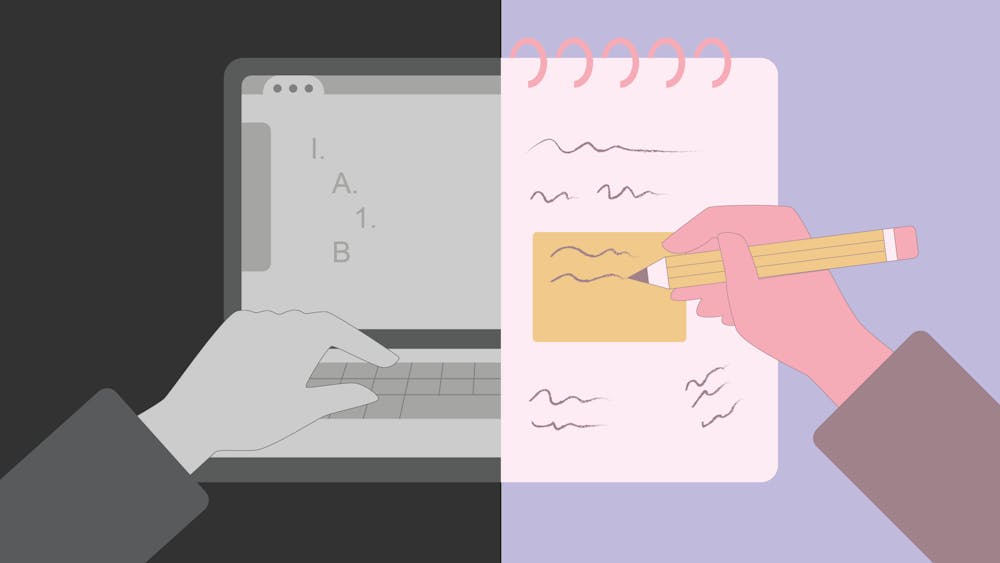
When I sit in a lecture hall, my eyes tend to wander away from the professor and toward my peers. You know the picture: Some students are chatting with their friends over iMessage, while others are browsing through Handshake, applying to various open positions. Still others are shopping online, or rushing a CIS assignment.
Believe me — I’ve been there. I’ve sat through classes so dry that I can’t help but open up my laptop and do something, anything, to make the time go by faster. That said, this seems to happen in every lecture, even in Penn’s highest-rated and most engaging courses.
It’s an epidemic of inattention, and I believe the best way to combat it is to start handwriting your notes.
From the very moment a professor begins to teach, odds are that students will start taking notes. There are students that copy everything down verbatim, and students who paraphrase what the professor is saying. For most courses, the latter type of student absorbs more information, because rewording material requires a stronger understanding of it than repeating it.
A typewriter is able to copy down more of what the professor is saying than a student that handwrites. But the underdog handwriter, scrambling to jot down notes on the surface, is winning out. A widely cited study by Pam Mueller and Daniel Oppenheimer reached a similar conclusion: though longhand writers and laptop users performed roughly the same on factual recall, longhand writers exceeded laptop users on conceptual application questions. They also found that notetakers with less verbatim overlap (often longhand writers) performed better overall, though that alone was not enough to explain the superior performance of the longhand writers.
In addition to decreasing verbatim overlap, longhand note-taking allows for more flexibility. Diagrams and graphs are often used to convey complicated concepts and relationships in courses across all disciplines, but are time-consuming to make with a laptop. And as with writing words, it’s similarly better for conceptual understanding to draw out these figures instead of pasting them from presentation slides or the internet.
But what makes longhand note-taking so great is not just the content on one’s paper, but the additional barriers it imposes to engaging in activities unrelated to class.
When I take notes exclusively on my laptop, finding something more engaging than the lecture at hand is as easy as opening a tab, and when I do find something, it is likely to keep me occupied for most of the class’ duration. After all, many sites on the internet are built to maximize engagement. A professor does not have thousands of analysts developing personalized algorithms to keep your attention the way that Instagram or TikTok might. I could always take out my laptop while I’m taking paper notes, but there are limitations to this: I hardly have the desk space, and I can only spend so much time on my laptop before I have to turn my attention away from it to jot down notes.
To make a long story short (as longhand note-takers do): Even if I do get distracted while taking notes on paper, I am distracted for far less time than if I had typed my notes.
Longhand writing has numerous other benefits. I don’t have to worry about my laptop’s battery life or my notoriously loud typing, and it is far more intuitive to highlight and use different colored pens on paper, as opposed to on a Google Doc. The average laptop weighs three to five pounds, while a five-pack of B5 Muji notebooks weighs 1.1 pounds. I am free to doodle on my paper notes, a habit which is thought to boost one’s memory. It is also harder for me to tell how much time has passed in a class — one of the worst feelings in the world is staring at the lower corners of a laptop, watching the digital clock inch by, minute by minute.
I would even go as far as to suggest paper long-hand notes over writing on electronic tablets, which are common in my engineering coursework. Using paper is significantly cheaper, more customizable, and more sustainable. In a comparative life-cycle assessment, paper notebooks outperformed tablets in nearly all environmental impact categories.
Not every second of a course deserves our undivided attention, but using laptops actively interrupts our ability to make the most of our classes. Considering how much many of us pay to attend Penn, as well as the many benefits that come from being educated here, we deserve better. I urge you to consider handwriting your notes whenever you can — you won’t regret it.
CAROLINE MAGDOLEN is a College and Engineering junior studying environmental science and systems engineering from New York City. Her email address is magdolen@sas.upenn.edu.
The Daily Pennsylvanian is an independent, student-run newspaper. Please consider making a donation to support the coverage that shapes the University. Your generosity ensures a future of strong journalism at Penn.
Donate






